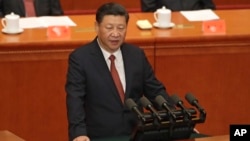When China’s Communist Party hosts a once-in-five-year congress next month, one key thing political analysts will be watching for is a name: Xi Jinping.
China’s current leader is one of the most powerful the country has had in decades, analysts argue, but one way his stature could be raised even further is to have his name added to the party’s constitution.
If it is, Xi could join others in the party’s pantheon such as former leader Deng Xiaoping and strongman Mao Zedong.
Since Mao Zedong ruled China, the key thoughts, ideas and ideals of the country’s Communist Party’s leaders have been added to its body’s constitution as it has single-handedly ruled one of the world’s most populous nations. But not all have had their names tagged on to their ideals.
The practice is something like President Franklin D. Roosevelt’s New Deal, said David Kelly, director of research at China Policy, a Beijing-based consulting company.
“[When] you think of Roosevelt, you think New Deal,” he said. “Powerful people want to leave these monuments behind as their legacy. To have that, it extends the lifetime of their political influence.”
When he retired in 2002, Jiang Zemin’s idea “Three Represents” was added to the party’s constitution. Later in 2007, Xi Jinping’s predecessor Hu Jintao had his “Scientific Outlook on Development” added. But only Deng and Mao had their names branded onto their ideas in the Constitution.
Late Monday, Chinese state media announced that during next month’s meeting, the party will write key theory and strategic thoughts outlined in the meeting into its constitution. The meeting opens on October 18.
'Xi Thought'
How “Xi Thought” or his name might be amended into the document is unclear, but some see the broad outlines of what type of changes could be made already taking shape.
Yang Kai-huang, head of Ming Chuan University's Cross-Strait Research Center in Taiwan, said a comment one of Xi Jinping’s former aides and current Jiangxi Provincial Governor Liu Qi made provides a clue. In a speech during political meetings earlier this year, Liu Qi mentioned the phrase, “Xi Jinping Governance: New Thoughts, New Theories and New Strategies.”
He is not the only one mentioning the phrase, although most don’t put the words Xi Jinping and governance so close together.
Yang said it would be too arrogant if it was called “Xi Thought” and a show of disrespect to Mao. And theory (as in Deng Xiaoping Theory), is too narrow as Xi has covered more areas such as Cultural, military development and Taiwan policies than Deng Xiaoping.
"His [Xi's] thoughts are actually a combination of those of both Mao and Deng. There wouldn't be Xi [thought] without Mao's Sinicization of Marxism or Deng's initiation of open market reforms," said Yang.
China Policy’s Kelly said that given Xi’s control of all government agencies, the media and propaganda, he can use any label he likes.
“He will, because he can, make himself the owner of Xi Jinping thought and then he will mix some domestic ingredients, very likely under the heading of creating a moderately prosperous society, and foreign policy advances that include Belt and Road, but probably will use the language of the China Solution,” he said.
Kelly adds China did not behave like a major power under Hu Jintao, but it has under Xi Jinping.
Some say the formula is meaningless and mostly about power, a game that political party leaders play.
Political commentator Paul Lin said thoughts written into the party charter are nothing but empty words. For example, he asked, "Was Hu’s Scientific Development really scientific? And while Xi has talked about rule of law, does he rule the country in accordance with the law or his own rules?"
“What’s clear is that it’s a move to further consolidate his power. Power is exactly what is on Xi’s mind.”
Yang said China’s definition of "rule of law" is different from the West, there have been some improvements under Xi, such as cases in which citizens filed lawsuits against government officials or made demands for transparency.
“What’s lacking in Xi’s rule is his tolerance [for dissidents],” he said. “If he can further achieve a set of rules or laws to show a higher degree of tolerance for dissidents that will be another important milestone for us to watch.”







